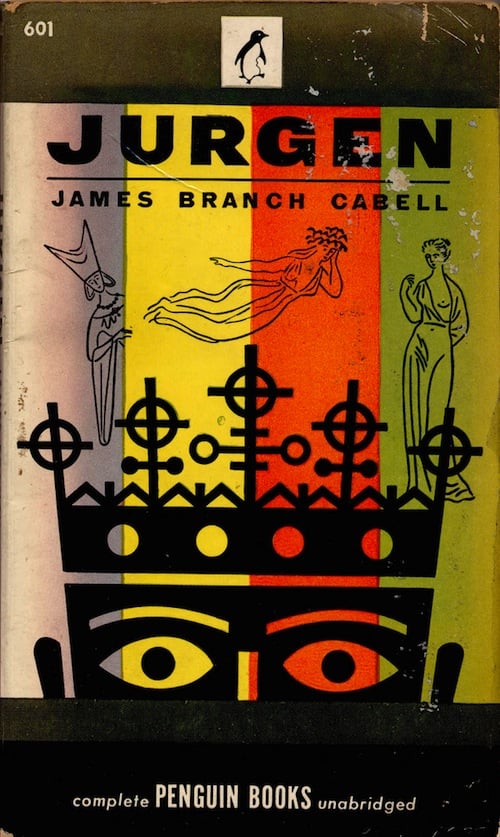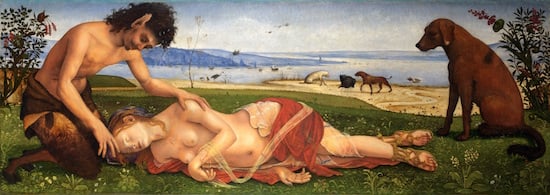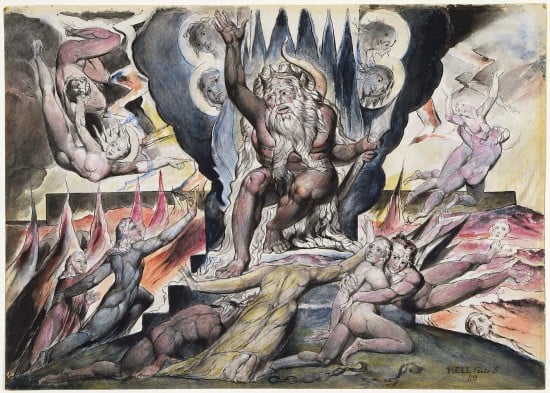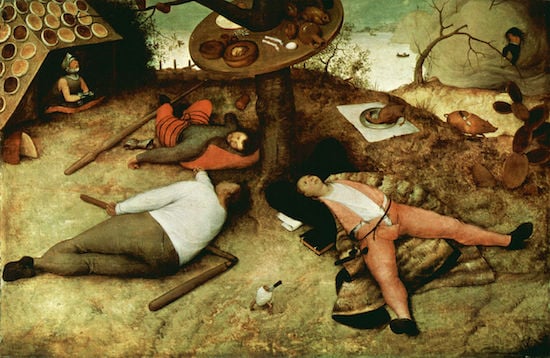Jurgen (22)
By:
August 11, 2015

James Branch Cabell’s 1919 ironic fantasy novel Jurgen, A Comedy of Justice, the protagonist of which seduces women everywhere he travels — including into Arthurian legend and Hell itself — is (according to Aleister Crowley) one of the “epoch-making masterpieces of philosophy.” Cabell’s sardonic inversion of romantic fantasy was postmodernist avant la lettre. HiLoBooks is pleased to serialize Jurgen here at HILOBROW. Enjoy!
Now the tale tells that Jurgen and this Lady of the Lake came presently to the wharves of Cameliard, and went aboard the ship which had brought Anaïtis and Merlin into Glathion. This ship was now to every appearance deserted: yet all its saffron colored sails were spread, as though in readiness for the ship’s departure.
“The crew are scrambling, it may be, for the largesse, and fighting over Gogyrvan’s silver pieces,” says Anaïtis, “but I think they will not be long in returning. So we will sit here upon the prow, and await their leisure.”
“But already the vessel moves,” says Jurgen, “and I hear behind us the rattling of silver chains and the flapping of shifted saffron-colored sails.”
“They are roguish fellows,” says Anaïtis, smiling. “Evidently, they hid from us, pretending there was nobody aboard. Now they think to give us a surprise when the ship sets out to sea as though it were of itself. But we will disappoint these merry rascals, by seeming to notice nothing unusual.”
So Jurgen sat with Anaïtis in the two tall chairs that were in the prow of the vessel, under a canopy of crimson stuff embroidered with gold dragons, and just back of the ship’s figurehead, which was a dragon painted with thirty colors: and the ship moved out of the harbor, and so into the open sea. Thus they passed Enisgarth.
“And it is a queer crew that serve you, Anaïtis, who are Queen of Cocaigne: for I can hear them talking, far back of us, and their language is all a cheeping and a twittering, as though the mice and the bats were holding conference.”
“Why, you must understand that these are outlanders who speak a dialect of their own, and are not like any other people you have ever seen.”
“Indeed, now, that is very probable, for I have seen none of your crew. Sometimes it is as though small flickerings passed over the deck, and that is all.”
“It is but the heat waves rising from the deck, for the day is warmer than you would think, sitting here under this canopy. And besides, what call have you and I to be bothering over the pranks of common mariners, so long as they do their proper duty?”
“I was thinking, O woman with unusual eyes, that these are hardly common mariners.”
“And I was thinking, Duke Jurgen, that I would tell you a tale of the Old Gods, to make the time speed more pleasantly as we sit here untroubled as a god and a goddess.”
Now they had passed Camwy: and Anaïtis began to narrate the history of Anistar and Calmoora and of the unusual concessions they granted each other, and of how Calmoora contented her five lovers: and Jurgen found the tale perturbing.

While Anaïtis talked the sky grew dark, as though the sun were ashamed and veiled his shame with clouds: and they went forward in a gray twilight which deepened steadily over a tranquil sea. So they passed the lights of Sargyll, most remote of the Red Islands, while Anaïtis talked of Procris and King Minos and Pasiphaë. As color went out of the air new colors entered into the sea, which now assumed the varied gleams of water that has long been stagnant. And a silence brooded over the sea, so that there was no noise anywhere except the sound of the voice of Anaïtis, saying, “All men that live have but a little while to live, and none knows his fate thereafter. So that a man possesses nothing certainly save a brief loan of his own body; and yet the body of man is capable of much curious pleasure.”

They came thus to a low-lying naked beach, where there was no sign of habitation. Anaïtis said this was the land they were seeking, and they went ashore.
“Even now,” says Jurgen, “I have seen none of the crew who brought us hither.”
And the beautiful dark woman shrugged, and marveled why he need perpetually be bothering over the doings of common sailors.
They went forward across the beach, through sand hills, to a moor, seeing no one, and walking in a gray fog. They passed many gray fat sluggish worms and some curious gray reptiles such as Jurgen had never imagined to exist, but Anaïtis said these need not trouble them.
“So there is no call to be fingering your charmed sword as we walk here, Duke Jurgen, for these great worms do not ever harm the living.”
“For whom, then, do they lie here in wait, in this gray fog, wherethrough the green lights flutter, and wherethrough I hear at times a thin and far-off wailing?”
“What is that to you, Duke Jurgen, since you and I are still in the warm flesh? Surely there was never a man who asked more idle questions.”
“Yet this is an uncomfortable twilight.”
“To the contrary, you should rejoice that it is a fog too heavy to be penetrated by the Moon.”
“But what have I to do with the Moon?”
“Nothing, as yet. And that is as well for you, Duke Jurgen, since it is authentically reported you have derided the day which is sacred to the Moon. Now the Moon does not love derision, as I well know, for in part I serve the Moon.”
“Eh?” says Jurgen: and he began to reflect.
So they came to a wall that was high and gray, and to the door which was in the wall.
“You must knock two or three times,” says Anaïtis, “to get into Cocaigne.”

Jurgen observed the bronze knocker upon the door, and he grinned in order to hide his embarrassment.
“It is a quaint fancy,” said he, “and the two constituents of it appear to have been modeled from life.”
“They were copied very exactly from Adam and Eve,” says Anaïtis, “who were the first persons to open this gateway.”
“Why, then,” says Jurgen, “there is no earthly doubt that men degenerate, since here under my hand is the proof of it.”
With that he knocked, and the door opened, and the two of them entered.
Footnotes from Notes on Jurgen (1928), by James P. Cover — with additional comments from the creators of this website; rewritten, in some instances, by HiLoBooks.
* Anistar and Calmoora — The curious probably can find the only satisfying account of this couple in Gerald Musgrave’s privately printed and extremely rare Myth of Anistar and Calmoora, the writing of which by the Sylan is described in Something About Eve.
* Procris — According to the ancients, the life of Procris was a series of domestic tragedies. While her husband, Cephalos, was held captive by Eos, the Dawn, who loved him, Procris met Minos and cured him of an evil charm, put upon him by his wife Pasiphaë, whereby he must fall in love with every woman whom he saw and work harm by that loving. Cephalos returned, disguised as another, and successfully wooed his wife. When he threw off the disguise, however, and revealed himself as her husband, her affection for him was so genuine that he forgave her for yielding. As a token of her love she gave to him a magic javelin which Minos had given her, and which could not miss its mark. With this javelin he hunted so frequently that Procris grew jealous. She followed him upon one of his hunting trips and, hiding near his hunting place, heard him invoking the breeze. His words were ardent, and his wife, not quite understanding them, thought they were addressed to some more tangible maiden. In her grief she forgot caution and made a movement that caused the bushes to rustle. Cephalos, thinking that some wild beast made the sound, hurled his unerring javelin at the spot and killed his wife.
* Minos and Pasiphaë — In classic mythology, Minos aimed at supremacy over Crete, and declared that is was destined to him by the gods, asserting as proof that the gods always answered his prayers. In offering up a sacrifice to Poseidon, he prayed that a bull might come forth from the sea, and promised to sacrifice the beast. The bull appeared, and Minos became king of Crete. However, his admiration for the bull was so great that he kept him and sacrificed another in his place; whereupon Poseidon rendered the bull furious and made Pasiphaë, the wife of Minos, conceive a passion for the animal. Daedalus, the artizan, constructed a wooden cow, by means of which Pasiphaë might gratify her passion, and she became the mother of the Minotaur, a monster half animal and half man.
RADIUM AGE SCIENCE FICTION: “Radium Age” is HILOBROW’s name for the 1904–33 era, which saw the discovery of radioactivity, the revelation that matter itself is constantly in movement — a fitting metaphor for the first decades of the 20th century, during which old scientific, religious, political, and social certainties were shattered. This era also saw the publication of genre-shattering writing by Edgar Rice Burroughs, Sax Rohmer, E.E. “Doc” Smith, Jack London, Arthur Conan Doyle, Aldous Huxley, Olaf Stapledon, Karel Čapek, H.P. Lovecraft, Charlotte Perkins Gilman, Yevgeny Zamyatin, Philip Gordon Wylie, and other pioneers of post-Verne/Wells, pre-Golden Age “science fiction.” More info here.
READ GORGEOUS PAPERBACKS: HiLoBooks has reissued the following 10 obscure but amazing Radium Age science fiction novels in beautiful print editions: Jack London’s The Scarlet Plague, Rudyard Kipling’s With the Night Mail (and “As Easy as A.B.C.”), Arthur Conan Doyle’s The Poison Belt, H. Rider Haggard’s When the World Shook, Edward Shanks’ The People of the Ruins, William Hope Hodgson’s The Night Land, J.D. Beresford’s Goslings, E.V. Odle’s The Clockwork Man, Cicely Hamilton’s Theodore Savage, and Muriel Jaeger’s The Man with Six Senses. For more information, visit the HiLoBooks homepage.
SERIALIZED BY HILOBOOKS: Jack London’s The Scarlet Plague | Rudyard Kipling’s With the Night Mail (and “As Easy as A.B.C.”) | Arthur Conan Doyle’s The Poison Belt | H. Rider Haggard’s When the World Shook | Edward Shanks’ The People of the Ruins | William Hope Hodgson’s The Night Land | J.D. Beresford’s Goslings | E.V. Odle’s The Clockwork Man | Cicely Hamilton’s Theodore Savage | Muriel Jaeger’s The Man With Six Senses | Jack London’s “The Red One” | Philip Francis Nowlan’s Armageddon 2419 A.D. | Homer Eon Flint’s The Devolutionist | W.E.B. DuBois’s “The Comet” | Edgar Rice Burroughs’s The Moon Men | Charlotte Perkins Gilman’s Herland | Sax Rohmer’s “The Zayat Kiss” | Eimar O’Duffy’s King Goshawk and the Birds | Frances Hodgson Burnett’s The Lost Prince | Morley Roberts’s The Fugitives | Helen MacInnes’s The Unconquerable | Geoffrey Household’s Watcher in the Shadows | William Haggard’s The High Wire | Hammond Innes’s Air Bridge | James Branch Cabell’s Jurgen | John Buchan’s “No Man’s Land” | John Russell’s “The Fourth Man” | E.M. Forster’s “The Machine Stops” | John Buchan’s Huntingtower | Arthur Conan Doyle’s When the World Screamed | Victor Bridges’ A Rogue By Compulsion | Jack London’s The Iron Heel | H. De Vere Stacpoole’s The Man Who Lost Himself | P.G. Wodehouse’s Leave It to Psmith | Richard Connell’s “The Most Dangerous Game” | Houdini and Lovecraft’s “Imprisoned with the Pharaohs” | Arthur Conan Doyle’s “The Sussex Vampire.”
ORIGINAL FICTION: HILOBROW has serialized three novels: James Parker’s The Ballad of Cocky The Fox (“a proof-of-concept that serialization can work on the Internet” — The Atlantic); Karinne Keithley Syers’s Linda Linda Linda (which includes original music); and Robert Waldron’s roman à clef The School on the Fens. We also publish original stories and comics. These include: Matthew Battles’s stories “Gita Nova“, “Makes the Man,” “Imago,” “Camera Lucida,” “A Simple Message”, “Children of the Volcano”, “The Gnomon”, “Billable Memories”, “For Provisional Description of Superficial Features”, “The Dogs in the Trees”, “The Sovereignties of Invention”, and “Survivor: The Island of Dr. Moreau”; several of these later appeared in the collection The Sovereignties of Invention | Peggy Nelson’s “Mood Indigo“, “Top Kill Fail“, and “Mercerism” | Annalee Newitz’s “The Great Oxygen Race” | Flourish Klink’s Star Trek fanfic “Conference Comms” | Charlie Mitchell’s “A Fantasy Land” | Charlie Mitchell’s “Sentinels” | Joshua Glenn’s “The Lawless One”, and the mashup story “Zarathustra vs. Swamp Thing” | Adam McGovern and Paolo Leandri’s Idoru Jones comics | John Holbo’s “Sugarplum Squeampunk” | “Another Corporate Death” (1) and “Another Corporate Death” (2) by Mike Fleisch | Kathryn Kuitenbrouwer and Frank Fiorentino’s graphic novel “The Song of Otto” (excerpt) | John Holbo’s graphic novel On Beyond Zarathustra (excerpt) | “Manoj” and “Josh” by Vijay Balakrishnan | “Verge” by Chris Rossi, and his audio novel Low Priority Hero | EPIC WINS: THE ILIAD (1.408-415) by Flourish Klink | EPIC WINS: THE KALEVALA (3.1-278) by James Parker | EPIC WINS: THE ARGONAUTICA (2.815-834) by Joshua Glenn | EPIC WINS: THE MYTH OF THE ELK by Matthew Battles | TROUBLED SUPERHUMAN CONTEST: Charles Pappas, “The Law” | CATASTROPHE CONTEST: Timothy Raymond, “Hem and the Flood” | TELEPATHY CONTEST: Rachel Ellis Adams, “Fatima, Can You Hear Me?” | OIL SPILL CONTEST: A.E. Smith, “Sound Thinking | LITTLE NEMO CAPTION CONTEST: Joe Lyons, “Necronomicon” | SPOOKY-KOOKY CONTEST: Tucker Cummings, “Well Marbled” | INVENT-A-HERO CONTEST: TG Gibbon, “The Firefly” | FANFICTION CONTEST: Lyette Mercier’s “Sex and the Single Superhero”
